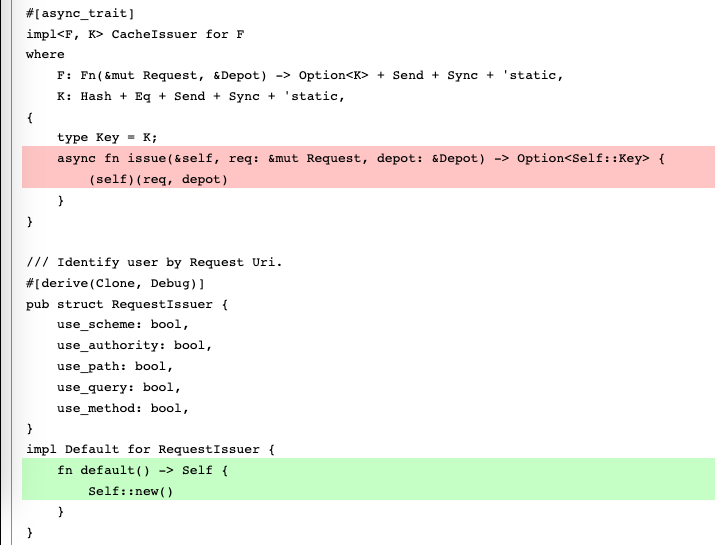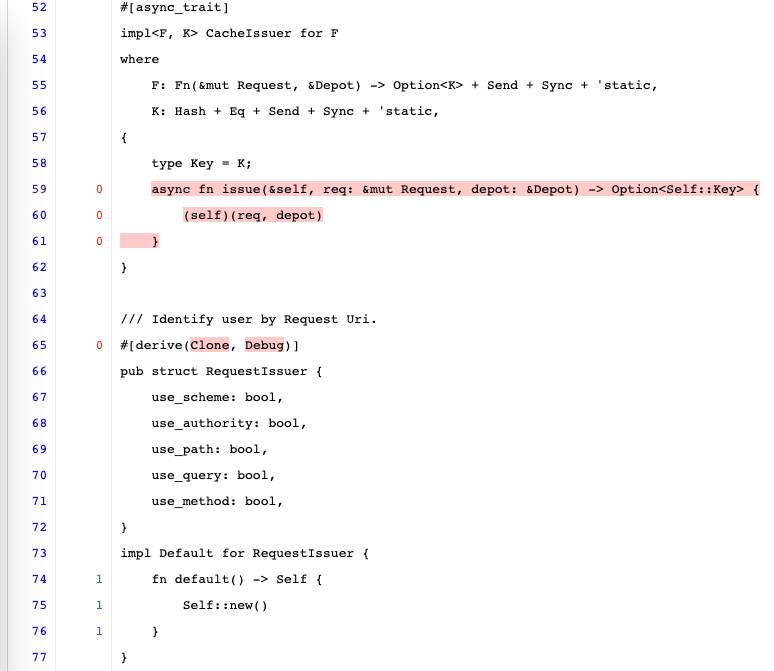Rust 项目单测覆盖率
共有 2 种比较方便的方式
tarpaulin
介绍一下tarpaulin
安装:cargo install cargo-tarpaulin
支持的功能比较多,文档很全不再赘述。等后面使用一段时间再补充一些常用的场景和踩坑记录
运行测试并得到覆盖率:cargo tarpaulin --out Html
这是我尝试之后相对满意的一个解决方案。执行之后会在项目跟目录生成一个单独的
tarpaulin-report.html文件,在浏览器中打开即可看到覆盖详情,唯一的缺点是没有行号,怀疑是我
自己没有配置好,毕竟显示行号这个功能比较简单

cargo-llvm-cov
cargo-llvm-cov是一个使用source-based code coverage的工具:
llvm-cov。
安装:cargo +stable install cargo-llvm-cov --locked
使用:cargo llvm-cov --open,生成html格式覆盖率报告,位于target/llvm-cov/html
首次运行会安装依赖:rustup component add llvm-tools-preview --toolchain stable-x86_64-apple-darwin
结论:极大地提升了使用LLVM source-based code coverage的效率,与tarpaulin相比,
覆盖率报告是按文件分布的,报告中有行号显示,但是页面展示效果不够明显

Rust 的覆盖率统计方案
如果直接 google rust code coverage,最先获取的信息应该是
The rustc book,
其中提到的rustc包括两种代码覆盖率实现:
gcov-based coverage implementation,基于 DebugInfo 生成覆盖率数据LLVM source-based code coverage,一个基于源代码的代码覆盖率实现,编译时使用-C instrument-coverage标志开启,它使用LLVM的原生、高效的覆盖工具来生成非常精确的覆盖数据。
但因为是编译器层面的支持,直接使用起来有点麻烦
然后基于 google 的搜索结果,我们进入Reddit的r/rust论坛,还可以找到上面用到的,基于已有的覆盖文件统计覆盖率的工具:grcov
CARGO_INCREMENTAL=0 RUSTFLAGS='-Cinstrument-coverage' LLVM_PROFILE_FILE='cargo-test-%p-%m.profraw' cargo test
grcov . --binary-path ./target/debug/deps/ -s . -t html --branch --ignore-not-existing --ignore '../*' --ignore "/*" -o target/coverage/html
grcov . --binary-path ./target/debug/deps/ -s . -t lcov --branch --ignore-not-existing --ignore '../*' --ignore "/*" -o target/coverage/tests.lcov其他
一篇博客介绍如何使用rust统计代码覆盖率